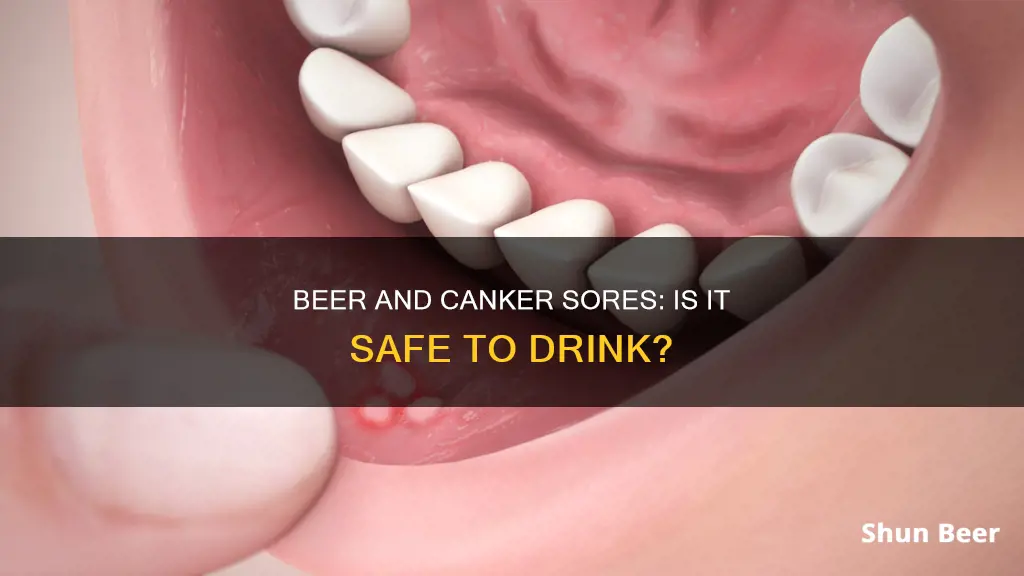
Canker sores are small, shallow ulcers that develop in the mouth, usually on the tongue, gums, or the inside of the cheeks or lips. They can be painful and make it difficult to eat, drink, or talk. While the exact cause of canker sores is unknown, they are believed to be linked to several factors, including stress, trauma to the mouth, certain foods, and nutritional deficiencies. When it comes to drinking alcohol with a canker sore, there are a few things to consider. Alcohol is known to be an irritant and can worsen the pain and discomfort associated with canker sores. It can also interfere with the healing process, leading to prolonged healing times. Beer, in particular, is considered harsh on canker sores. Additionally, alcohol can cause dehydration, which can further worsen the pain of a canker sore. Therefore, it is generally recommended to avoid drinking alcohol when dealing with a canker sore and instead, focus on keeping the area hydrated and reducing inflammation.
What You'll Learn
- Beer is known to be particularly harsh on canker sores
- Alcohol can delay the healing of canker sores
- Alcohol can cause dehydration, which can worsen the pain of a canker sore
- Alcohol may contribute to canker sores due to its acidic nature
- Drinking alcohol in moderation may be okay if you have a canker sore

Beer is known to be particularly harsh on canker sores
Alcohol, including beer, is known to contribute to the development of canker sores. Firstly, alcohol interferes with folic acid absorption and increases its excretion through urine, leading to a deficiency. Folic acid, or folate, is a type of B vitamin crucial for DNA repair. Nutritional deficiencies of folic acid, vitamin B12, and iron are associated with a higher occurrence of canker sores. Therefore, alcohol-induced folic acid deficiency may be a contributing factor to the development of these sores.
Secondly, alcohol has drying properties that reduce saliva production in the mouth. Saliva plays a vital role in preventing infections by controlling bacteria and fungi. By dehydrating the body's cells and decreasing saliva production, alcohol creates an environment conducive to the development of canker sores.
Additionally, alcohol is acidic in nature, which may contribute to triggering or aggravating mouth ulcers. The acidity of alcohol can irritate the inflamed mucous membranes and delay the healing process. This is why it is generally recommended to avoid alcohol until mouth ulcers have healed.
Beer and Vodka: Mixing Alcohol Safely
You may want to see also

Alcohol can delay the healing of canker sores
Alcohol can also deplete the body's moisture and nutrients, creating conditions that are conducive to the formation of painful ulcers. It does this by interfering with the absorption of folic acid and increasing its excretion through urine, often resulting in a mouthful of canker sores. Folic acid, or folate, is a type of B vitamin that is important for DNA repair. People with nutritional deficiencies of folic acid, vitamin B12, and iron tend to develop canker sores more frequently.
Additionally, alcohol has dehydrating effects, suppressing saliva production. Saliva is important as it serves to protect and moisten oral tissues, preventing infection by controlling bacteria and fungi in the mouth. Without adequate saliva, the mouth becomes dry and vulnerable to canker sores.
Alcohol is also highly inflammatory. Acetaldehyde, the first byproduct of alcohol metabolism, triggers widespread inflammation by increasing cytokine and prostaglandin production. This prevents effective tissue healing and exacerbates ulcerative lesions.
If you are battling open sores, it is best to avoid alcohol as it will only delay the healing process and make your canker sores worse.
Beer Ads: Drinking on the Job?
You may want to see also

Alcohol can cause dehydration, which can worsen the pain of a canker sore
Canker sores are shallow sores with a white or yellow centre and a red border. They are usually found on the tongue or the inside of the lip or cheek. They can be quite painful and may make it difficult to talk or eat. While the cause of canker sores is unknown, they tend to run in families and are not contagious.
Alcohol can irritate canker sores and make them more painful. It can also interfere with the healing process, causing the sores to take longer to heal. In addition, alcohol can cause dehydration, which can worsen the pain of a canker sore. Alcohol is a drying agent that dehydrates the body's cells and decreases saliva production. This can leave the mouth more vulnerable to infection and inflammation, which can exacerbate the pain and discomfort of a canker sore.
Beer, in particular, is known to be harsh on canker sores. It is important to note that alcohol can also interact with certain medications used to treat canker sores. Therefore, it is generally advised to avoid drinking alcohol if you have a canker sore.
If you have a canker sore, it is recommended to drink plenty of water to keep the mouth hydrated and reduce the pain associated with the sore. Other beverages that can help soothe the pain include herbal teas, warm water with honey and lemon, and cold beverages such as smoothies.
While canker sores usually heal on their own within a few days, it is important to seek medical attention if the sores persist for more than two weeks or are accompanied by a fever, chills, or other symptoms.
Monkeys and Beer: A Safe Combination?
You may want to see also

Alcohol may contribute to canker sores due to its acidic nature
Canker sores are shallow, crater-like sores with a red border and a white or yellow centre. They are often painful and can make it hard to talk and eat. The cause of canker sores is unknown, but they tend to run in families and cannot be spread to other people.
Alcohol also has dehydrating effects, suppressing saliva production. Saliva prevents infection by controlling bacteria and fungi in the mouth. Without enough saliva, the mouth becomes more vulnerable to infection and inflammation. Alcohol also disrupts the absorption of folic acid and increases its excretion through urine, leading to potential deficiencies. Folic acid, or folate, is a type of B vitamin that helps in the DNA repair process. People with nutritional deficiencies of folic acid, vitamin B12, and iron appear to develop canker sores more frequently.
Beer and Workouts: Light Beer's Impact on Fitness
You may want to see also

Drinking alcohol in moderation may be okay if you have a canker sore
Canker sores are shallow, crater-like sores with a red border and a white or yellow centre. They can be painful and may make it difficult to talk or eat. While the cause of canker sores is unknown, they tend to run in families and can be triggered by factors such as stress, injury to the mouth, or nutritional deficiencies.
Alcohol may contribute to the development of canker sores, and it is generally advised to avoid drinking alcohol if you have an active sore. Alcohol can irritate the sore, making it more painful and delaying the healing process. Beer, in particular, is known to be harsh on canker sores. Additionally, alcohol can cause dehydration, which can worsen the pain associated with canker sores.
However, if you choose to drink alcohol in moderation while having a canker sore, it is important to be mindful of the amount consumed and to stay hydrated. Alcoholic beverages such as wine or liquor may be less irritating to the sore than beer. Drinking water can help keep the mouth hydrated and reduce the risk of further irritation or inflammation.
Furthermore, eating foods high in folic acid before consuming alcohol may help decrease the chances of developing canker sores. Breakfast cereals, leafy vegetables, and legumes are good sources of folic acid. It is also recommended to avoid irritating foods and drinks, such as carbonated beverages, hot drinks, spicy foods, and acidic foods like tomato-based dishes.
Beer and Amox-Clav: Is It Safe to Drink?
You may want to see also







